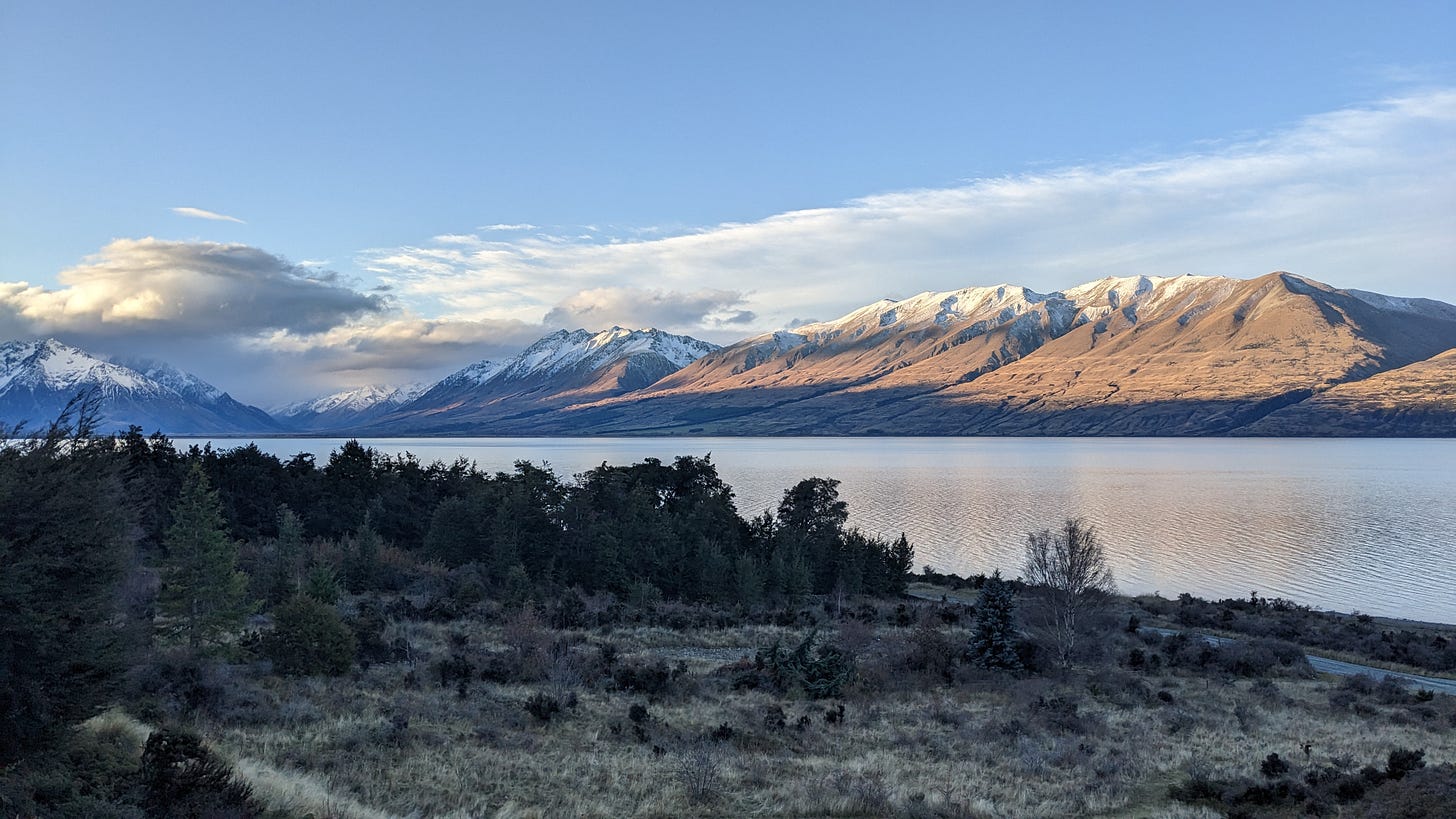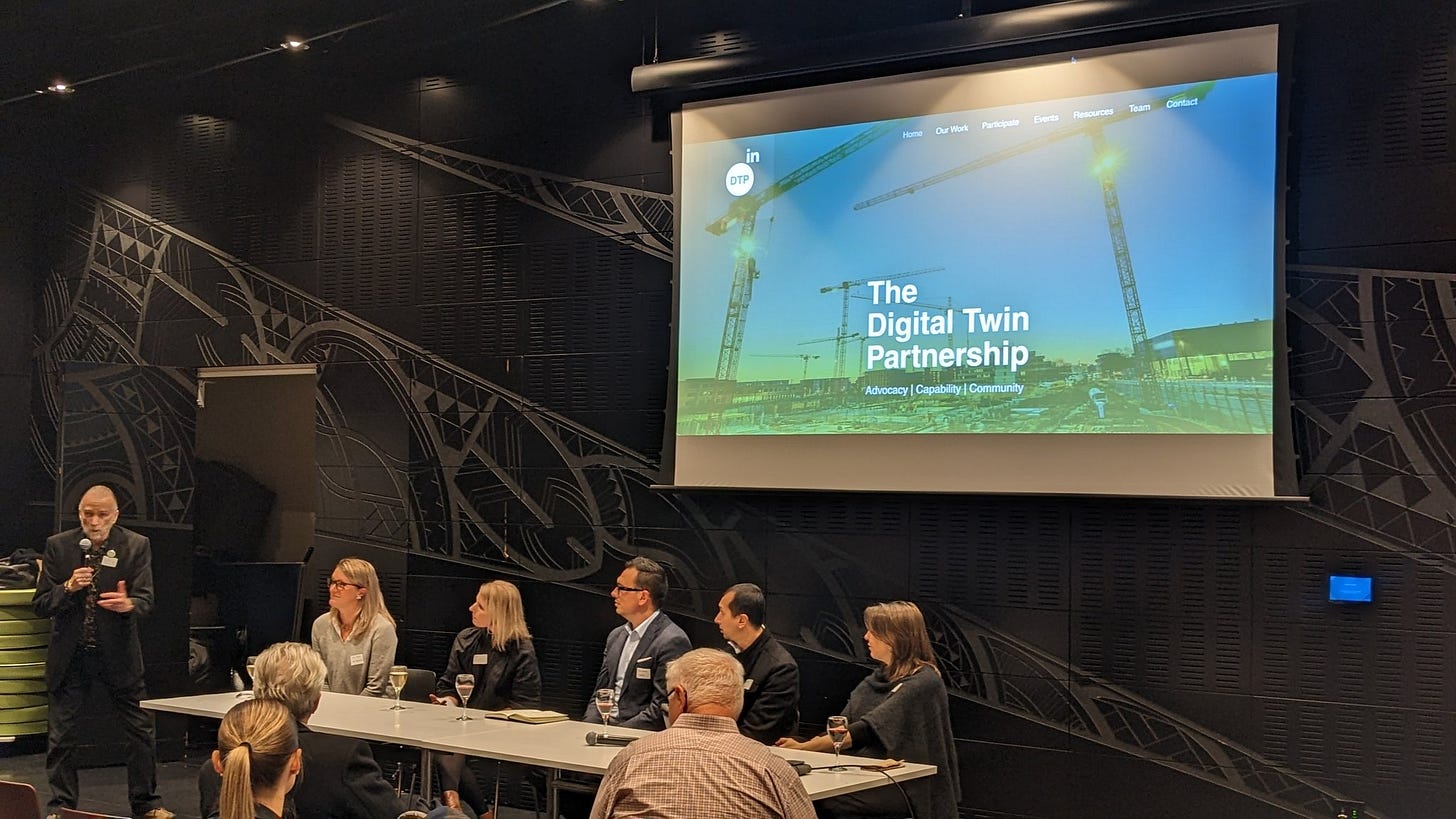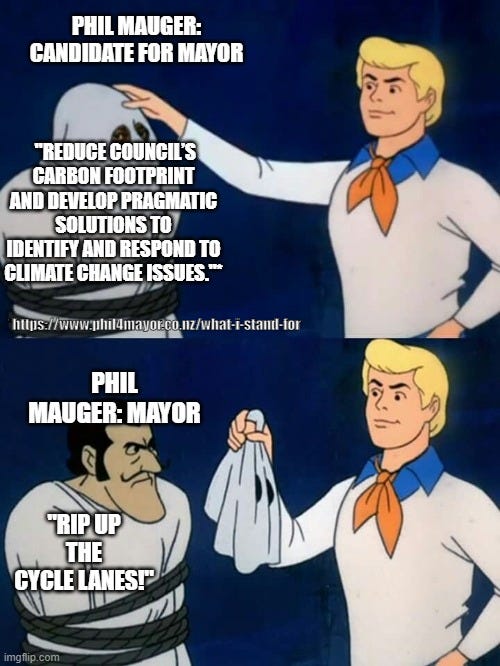⏩🇳🇿 #42: portfolio completion!🫧✅a national conversation on generative AI📈digital twin partnership🧑🤝🧑(anticipatory?) biotech regulation🧬a future-facing nation🔮
Pick your worldview
Kia ora,
Welcome to this week’s ⏩Fast Forward Aotearoa, my newsletter and book-in-progress thinking about emerging tech and the unfolding future in my corner of the world, Aotearoa New Zealand. Thanks for reading!
(TIP: If you want to keep receiving the weekly Wednesday Memia emerging tech newsletter but prefer not receive these Aotearoa-focused posts you can manage your subscription preferences here.)
I’ve been doing the digital nomad thing over the weekend, trying to accelerate finishing the book (start the final chapter next week!) while biking the Alps 2 Ocean cycle trail to get some oxygen into the brain.
The views on Sunday over Lake Ōhau were stunning (but pretty damn freezing …!)
🔑🟤Aotearoa roundup
A roundup of threads I’ve been tracking recently…
📈A national conversation on generative AI
Education innovator and futurist Frances Valintine raised the flag for a “national conversation” on generative AI: New Zealand - Seeking your interest in starting the critical conversation around generative AI:
“We have all lived with regular change over the last decade. Across the world, climate change protests have become a visible force of activism used to drive awareness to communities of the massive risks if we delay our actions to reduce carbon. We have had years to learn and to understand consequences of global warming, and even with this knowledge, local action is slow.
By comparison, Generative AI did not arrive with advanced notice, or give us the luxury of time to think about whether we wanted it as part of our future. Almost as soon as it became accessible as a helpful tool in our lives, the risks began to be communicated by global senior AI researchers as each touted their own view of a future doomsday scenario shaped by wide scale AI adoption.
…Meanwhile conversation is quiet on the local front. The only media story I am being asked (on repeat) is my views on the effect generative AI will have on plagiarism and education achievement.
This is not a time to play the New Zealand ‘small and isolated card’, or to imagine that as a nation of small and medium businesses that we will somehow be immune to the impact of AI as it sweeps through our industries, institutes, government and our jobs.”
It’s a strong analysis and I’m supportive of the initiative.1
My immediate response to Frances in the comments:
“Great analysis - thanks for taking the initiative to start a conversation Frances Valintine CNZM. The vacuum of policy in Wellington continues... and so far to my knowledge, no party has actually articulated any AI policies to take to the election . (Raf Manji, James Shaw... ?)
(Meanwhile in Australia, the exceptional Ed Husic MP is overseeing a A$1Bn investment programme to build capability across a range of emerging technologies including AI and quantum computing. https://www.minister.industry.gov.au/ministers/husic/media-releases/critical-technologies-securing-australias-future)
On generative AI, the platform lock-in issue is the most pressing issue to my mind. As a country we have sleep-walked into the current situation - the signs have been there for years that AI models will soon be as powerful as GPT-4... and hence we should maybe look to understand the implications... (The TOTAL short-termism and absence of foresight in our government and businesses is now finally out in plain sight, at least...)
(BTW There's way more technological disruption coming, quicker...who's preparing?)
FWIW my (coming very soon...!) book ⏩Fast Forward Aotearoa proposes the establishment of two new public functions:
1) A cross-government national strategic foresight agency (see Singapore's Centre for Strategic Futures for global best practice https://www.csf.gov.sg/who-we-are/)
2) A Public [Digital] Technology Agency (in the mould something like a traditional national broadcaster...) which would be responsible for coordinating investment in building domestic technological capability, including actually hosting its own AI models (leveraging global open source efforts alongside every other country out there except US and China....). To my mind the only way to ensure that Aotearoa maintains some degree of sovereignty over these society-altering AI technologies is to develop, maintain and provide our own.Happy to contribute to the conversation as I can.”
🧑🤝🧑Digital Twin Partnership
Thanks to Reveal’s Sam Wiffen for the invite to the Te Waipounamu launch of the new Digital Twin Partnership Aotearoa last week. This organisation is aligned with an international movement advocating for the nascent digital twin sector:
“building capacity through collaboration, innovation and standardisation, and acting as a catalyst for leading Digital Twin policy making and practice”
An expert panel discussion followed which focused mostly on the applications of digital twins for built infrastructure and the challenges of sharing data across public and private sector stakeholders… (my fundamental question: how does the infrastructure sector which thinks in decades and centuries adjust to the cadence of technology which advances in weeks and months…?)
😶🌫️Pick your worldview
(In the runup to this year’s general election, I’m going to be covering policies on issues that are important for me and, I’m guessing, much of Memia’s readership in Aotearoa… please let me know if I should tone it down or ramp it up).
Two contrasting election announcements in the last two days. Pick your worldview:
The Greens turned up the temperature with a fully costed Wealth Tax policy:
(Instant reaction on Twitter: “lies and theft”. Asset-rich boomers won’t let this happen quietly…)
The Greens’ proposal is more comprehensive in its scope of what would be taxed than TOP’s Land Value Tax…but as a result would be more complex to administer and could take years to establish. Perhaps LVT could be considered a rapid “phase 1” and full wealth tax is “phase 2” — particularly if TOP’s Raf Manji wins Ilam and there is post-election bargaining on the finer points…)
Meanwhile National just released their new policy on Agricultural emissions… which pushes back even further the final deadline by which farmers have to start paying for them. The headline:
“Agriculture is the backbone of New Zealand’s economy, contributing 11 per cent of GDP, 14 per cent of employment and 81 per cent of goods exports.“
….and, lest we forget, nearly half of ALL greenhouse gas emissions.
(Leaving aside methane emissions, shouldn’t there be a conscious national strategy to steer the economy away from an 81% dependency on agricultural exports in a time of rapid climate change!?!)
Anyway, transparent political tribalism to ensure the vote of rural voters. More interestingly: inside the National climate policy is a proposal to end the ban on gene editing and establish a new Biotech regulator:
“National will remove the effective ban on gene editing (GE) and genetically modified (GM) products in New Zealand and create a biotech regulator to ensure safe and ethical use of these technologies. National will also streamline approvals for trials and use of non-GE/GM biotechnologies, including methane inhibitors”
(I was speaking to someone close to developments last week and they were pretty bullish that initiatives such as “Kowbucha” are on track to “solve” the emissions issue in just a few years (by which I understand “methane neutral cows”). Colour me sceptical… but if it works why not?
(The sad thing is this biotech policy is driven solely by the aim of reducing methane emissions from cows so the country can continue to pump out milk solids to China… surely there are higher economic aspirations…)
Again, progressive party TOP already had a policy in this space since 2019. Dunedin scientist and candidate Ben Peters speaks about his ongoing frustration working in the field of biochemistry in Aotearoa:
“The legislation around gene editing and genetic modification was hampering the efforts of our scientists to create solutions to some of the major problems that are facing New Zealand, like climate change. A cumbersome bureaucracy was stifling innovation. At the time I joked with a few about starting a science-based political party to get the change we needed. Little did I know that was already in the works.“
My 2c: a positive policy direction for science in Aotearoa….but already behind the curve. Next step: anticipatory regulation for AI-accelerated synthetic biology!
🎭Unmasked
(An issue close to my heart as someone who bikes regularly in Ōtautahi …)
The latest battle of the Christchurch cycleways was won decisively by the side of the cyclists. Apart from the fact the proposal to rip up a brand new bike lane was a ludicrous dog whistle to reactionary suburb-dwelling car owners, the biggest lesson is to beware boomer mayoral candidates standing on a “reasonable” greenwashed climate ticket:
🫧Portfolio completion!✅
*Finally* finishing up my “starter for 100” national technology investment strategy which is the key deliverable of my book ⏩Fast Forward Aotearoa. The last three illustrative mission-oriented technology investment portfolios below:
🟰Mission: An equitable society
A set of targeted technology investments to improve the overall equity of Aotearoa’s society, implementing forcing functions to reduce inequality of wealth, income and digital opportunities to levels considered acceptable on a democratic basis.
😶🌫️Mission: Mental health for all
A set of targeted technology investments to improve the overall mental health of Aotearoa’s society, leveraging the latest AI and IoT sensor technology to provide treatment and support to help address the growing mental health epidemic.
🔮Mission: A future-facing nation
A set of targeted policy interventions, new institutions and technology investments to improve the ability of Aotearoa to function independently AND inter-dependently in a future world where control over technology and capital equals power.
🟰Mission: An Equitable Society
A set of targeted technology investments to improve the overall equity of Aotearoa’s society, implementing forcing functions to reduce inequality of wealth, income and digital opportunities to levels considered acceptable on a democratic basis.
The more speculative proposals involve augmenting the functionality of money (and monetary policy) to actually implement redistribution.
Keep reading with a 7-day free trial
Subscribe to Memia to keep reading this post and get 7 days of free access to the full post archives.











